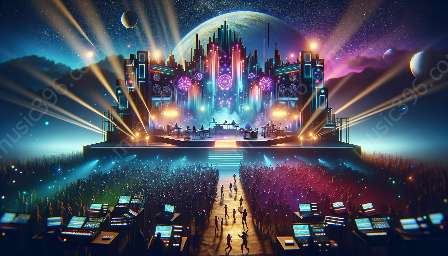The influence of DJs on the electronic music scene is immeasurable, shaping the culture and sound of this dynamic genre. From their roles as tastemakers to their live performances, DJs play a crucial part in the evolution of electronic music. In this article, we will explore the impact of DJs on the electronic music scene, delving into the science behind electronic music and its cultural significance.
The Role of DJs in Shaping Electronic Music
DJs are integral to the development and dissemination of electronic music. They not only curate and mix tracks but also contribute to the creation of new sounds and subgenres. Through their performances, whether in clubs, festivals, or on radio shows, DJs introduce audiences to innovative beats and experimental compositions.
Tastemakers and Trendsetters
DJs are often considered tastemakers within the electronic music community. They have the ability to break new artists, tracks, and styles, influencing the preferences of their listeners and shaping trends within the genre. By showcasing lesser-known tracks or underground artists, DJs can propel their careers and introduce fresh sounds to their audiences.
Live Performances and the Art of DJing
The art of DJing goes beyond simply playing music. Skilled DJs employ techniques such as beatmatching, scratching, and live remixing to create an immersive experience for their audience. Their live performances often involve intricate mixing and seamless transitions, captivating listeners and elevating the energy of a venue.
The Science of Electronic Music
Electronic music is built upon the principles of sound synthesis, electronic instrumentation, and digital processing. The science behind electronic music encompasses the manipulation of waveforms, the arrangement of sonic elements, and the use of technology to create unique sounds. Understanding the science of electronic music allows DJs to innovate and push the boundaries of sonic experimentation.
Sound Synthesis and Digital Processing
Electronic music production involves the synthesis of sound using various techniques, including subtractive, additive, and wavetable synthesis. Additionally, digital processing techniques such as filtering, modulation, and effects processing contribute to the creation of distinct sonic textures and atmospheres.
Software and Technology
DJs and electronic music producers utilize a wide array of software and hardware tools to craft their compositions. Digital audio workstations (DAWs), synthesizers, samplers, and audio effects plugins enable artists to manipulate sounds and sculpt intricate sonic landscapes, blurring the boundaries between traditional instrumentation and digital innovation.
The Cultural Impact of Electronic Music
Electronic music has transcended its origins to become a global cultural phenomenon, influencing fashion, visual arts, and nightlife experiences. The seamless integration of technology and artistry has contributed to the creation of immersive audiovisual performances, further solidifying electronic music as a vital component of contemporary culture.
Cultural Fusion and Diversity
Electronic music embraces diversity and cultural fusion, drawing inspiration from a myriad of musical traditions and global influences. DJs play a pivotal role in connecting audiences to sounds from around the world, fostering a sense of inclusivity and unity through music.
Collaborative Innovation
The collaborative nature of electronic music production allows for cross-genre experimentation and boundary-pushing creativity. DJs often collaborate with visual artists, stage designers, and technology innovators to deliver multisensory experiences that push the boundaries of traditional performance art.


